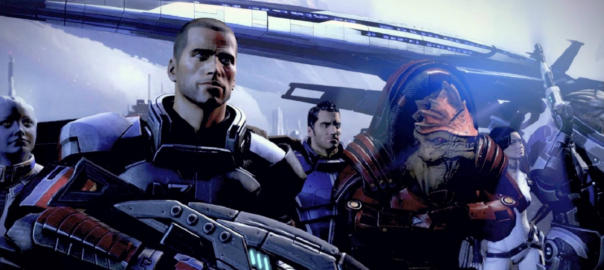Storytelling in video games is one of the biggest challenges in front of a game developer. A gripping story gives shape and meaning to the obstacles of each stage. What makes video games unique is the participation of the reader, the viewer, the gamer. In a traditional storytelling mode like prose fiction or cinema, we as the audience are just observers in the action. Because we-as-the-audience are actually playing in a video game, we want to feel that our actions have an effect on the story. The Mass Effect series is one of the most ambitious tries at melding storytelling with participation. Yet even in Mass Effect, we’re still mostly observing the plot. False choices abound in the game and, goody-goody or violent bully, the conduct of main character Shepard is pretty much the same. It proves that there are still real conceptual boundaries to how we think about stories being told.
The first Mass Effect game is much different than the later two but they are all in the same genre: pause-and-cover-based shooters with fantasy powers. That basic game gets expanded upon by the roleplaying aspects of the other parts: world-roaming gives new tools and powers to use as well as promising interesting encounters with planted characters, and the cutscenes give the bulk of the story context. The first game’s system of equipment and skill training was simplified in Mass Effect 2 as that game focused on the shooting gallery aspects, downplaying the original long pauses for power usage and its more explorable spaces.
The story being told is an epic science fantasy about humanity and its non-human allies facing down an existential threat from the unfathomable past. Regardless of the method they take to get there, the Mass Effect games deliver that story in a very polished way. That doesn’t mean that the player is involved in the story. Just like in a less-epic action game, the role of the player is primarily to kill the baddies. If the baddies are killed, the story advances. If they aren’t, the story stalls; usually, the player is given enough chances to eventually get the story going again. Mass Effect presents the player with a lot of choices that ultimately have very little effect on the story. The fate of the Council from the first to the second game is a key example: what should be a monumental event has no effect on the situation that unfolds beyond changing a few lines of dialogue. The chances of the Alliance are not significantly better or worse given your decision. You don’t even gain the promise of allegiance or not due to it. As players of Mass Effect we are ultimately just observers being kept happy with a few trinkets.
Mass Effect does provide engaging trinkets to keep our attention. Borrowing from sports games like Madden and the NBA2K series, Mass Effect allows not only player character creation but porting from one game to the next, giving the impression of continuing the same story. Its planetary exploration parts differed from game to game but were interesting diversions. The ability to buy useless items was a nice touch, a way to further personalize the experience (though I don’t believe these items transferred from game to game). Not only this, the Mass Effect games are fairly tight and the action bits reward some attention to the less-action tasks, helping to link everything together. The fact remains that they are trinkets. The problem with trinkets is that they’re a distraction.
I believe that there is a way to more directly marry the gameplay experience with storytelling, so that playing the game can advance the story in significant ways other than the simple success equals advancement equation. Of course, direct game experience is not the only way to tell a great story. As I’ve said, traditional stories have been told for a long time with we-as-the-audience serving as observers only. If that’s the mode that Mass Effect wants to pursue then they should dispense with the false choices like the paragon/renegade system which very rarely has an effect on what you do and never a major one. The story of the games would be much clearer and more exciting without the distractions of trying to be rude enough to get your evil points or laboriously spinning globes and reading mountains for resources. I don’t believe that Mass Effect is particularly well-suited to direct gameplay driving the story; its focus on action combat and insistence on an exposition-heavy story stand too much at odds for them to complement each other. Still, if the idea is to give the player some choice, make at least a few significant. In Mass Effect 2, the ability to remain with Cerberus or rejoin the Alliance would have been a major choice that could have in effect created two unique branching paths with different missions and approaches, even different endgames. Then, at least, a decision made can really alter how the story turns out.
